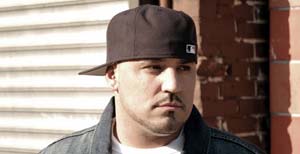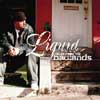Liquid
Genre: Urban/R&B
Official Web Site
Liquid Bibliography: (click on each album cover to view tracks and Liquid lyrics)
Liquid Biography When a debut artist possesses unmistakable street cred and stellar, dripping-from-the-pores creativity, the combo is as lethal as it is uncommon. But then again, Liquid, the boundlessly gifted, smooth-as-silk singer/songwriter/producer born and bred in a notorious section of inner city Philadelphia-is anything but common.
Drawing from a vast, deliciously eclectic array of musical influences, Liquid succeeds right off the bat in creating a unique language of aural expression, effortlessly blending Latino-tinged R&B, old-school hip-hop, and 1970s soul with rock, jazz, reggae, and even flamenco melodies over the course of a dozen freshly baked tracks that lyrically embody the complex realities of the streets via deft poetry and stark, eye-opening storytelling.
Of course when you dub your debut album Tales From The Badlands, there's clearly a parable behind the performances-a story behind the songs. And indeed underneath the lyrics and the compelling thump-and-slide of his rhythms and melodies, Liquid's bare soul reveals a life full of tough times and trial after trial-literally from the very start.
"My mom was 17 when I was born, and my dad turned 15 just 11 days later," Liquid shares. "Then my dad's family moved to California, so I didn't grow up with my father. My mom was in and out of my life; she did what she could, but she was very deep into drugs at one point and never steady enough to raise me. So I spent most of my time with my grandmother, and she took me in after my mom died. I was 12, and I was used to running in the streets most of the day, learning how to survive. But when my brother told me he was selling his keyboard for $100, I begged my grandmother to buy it; and she did. That's when music really started for me. I locked myself in my room for hours and hours. It was my therapy-and it kept me off the streets."
Significantly, those very streets were made nationally infamous by 20/20, which aired a special about them in 1990 called "The Badlands". With the blight of urban decay filmed all around him, Ted Koppel interviewed young people subsisting on crime and crack. The reverberations were felt far and wide, but for Liquid, then 15, the show left a bad taste in his mouth.
"I lived 10 blocks from where they shot that whole series," Liquid reveals. "But the neighbourhood wasn't called 'The Badlands' before 20/20 named it. And for me, I've felt nothing but love from there. So I think this record is me saying, 'Hey, look at what's come from the place you call 'The Badlands'."
I'm from the ghetto where guns are used by little ones that are often abused / and Twenty-Twenty bad lands the news / consist of thugs but Christians live here, too / let's change... city of gangstas and brotherly love, city of hustlers and suffering thugs / but there's a sign of life in our youth / they look up to the things we do / teach them to love and we cant lose / help them to find a right path to choose... ("Ghetto")
Laying down his own lyrics on the studio microphone was relatively new territory for Liquid, but his production experience immeasurably strengthened The Badlands album. Venturing far outside the scope of most R&B and hip-hop (in fact, most musical genres in general), Liquid not only dresses the poetic lyrics with deep meaning but also with at-once significant and subtle structure.
For instance, opening the album is Sunrise, a languid tune that explores the dual meaning of light:
I woke up this morning to watch the sun rise / to see how the darkness respects the sunlight / a brand new day and chance it brings this light uncovers everything like you did when you rescued me...
The album's closing track is Sun Goes Down, which smartly employs a spare variation on the opener's melody while frankly discussing the dual nature of the city as the day closes-the good and the bad:
Walking through my neighborhood in the middle of July / All the little girls and boys are playing outside, the water plug is on / Five-O is on patrol, and as far as I can tell everything is fine / 'Til the sun goes down...
"The day-in-the-life thing is exactly what I was going for," Liquid explains. "The dark and light double meaning is important, and it also stands for the hope that the inner-city will embrace God... today. Every time we have daylight is another chance to live. It's about celebrating the warmth that the light can bring-and God's light. So... are we gonna push him away or be thankful that we have the sunlight?"
In the midst of Liquid's depth-filled "day" are wide-ranging musical statements that address issues close to his heart. Pressing On stretches beyond Philly and calls on believers to stand firm in the face of oppression all over the world; One Time pleads with those who haven't yet embraced Christ that his love is but a moment away; and earning high marks for narrative excellence are Good to Be Back (the shockingly vivid story-song about a husband and father about to be released from prison) and Gangsta (which takes listeners through the protagonist's sad life). Despite all the seriousness on The Badlands, Liquid shows a seriously fun side of him as well, evidenced by Back in the Day, a joyous, raucous, rock-tinged track that celebrates his childhood and gives musical props to the old-school artists who so heavily influenced Liquid over the years.
"My goal is to be as honest as possible, in every sense," he notes. "I want to be honest about the drug dealers and crime, that thugs pull out guns three yards away from you, the fights; it's all horrible stuff. But I also remember growing up that if we ever needed anything, even a loaf of bread, our neighbours took care of us. We took care of each other, and that's the honest part of what came along with the crack addicts and drug dealers. I feel like people in the ghetto have the same basic problems as kids in Beverly Hills, it just looks different. I want to reach kids from the inner city as well as from the suburbs. With everything I've ever written down lyrically and musically, I ask God to stamp the song with his love. I want God to take control and do what he wants through my music for the world."
|



